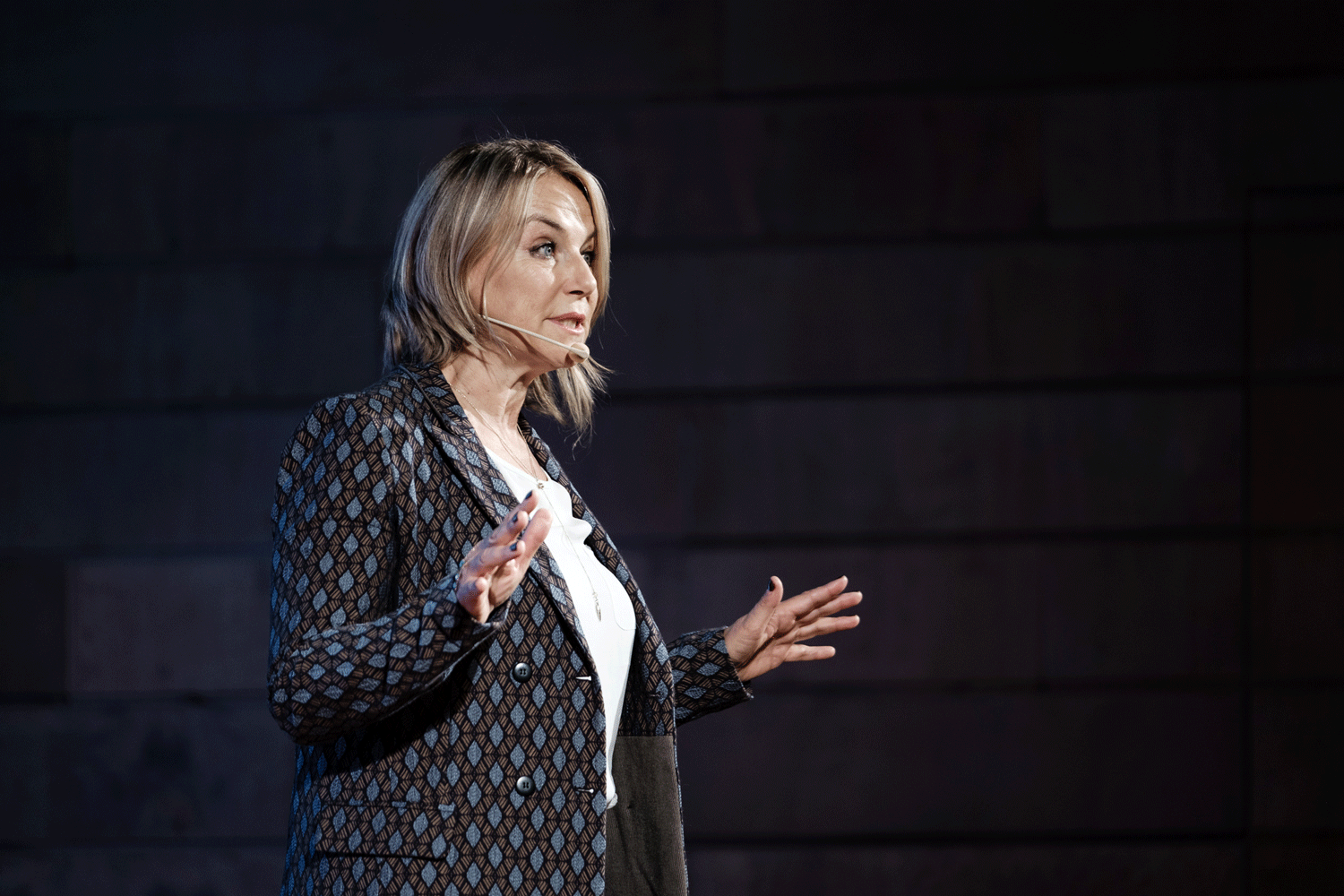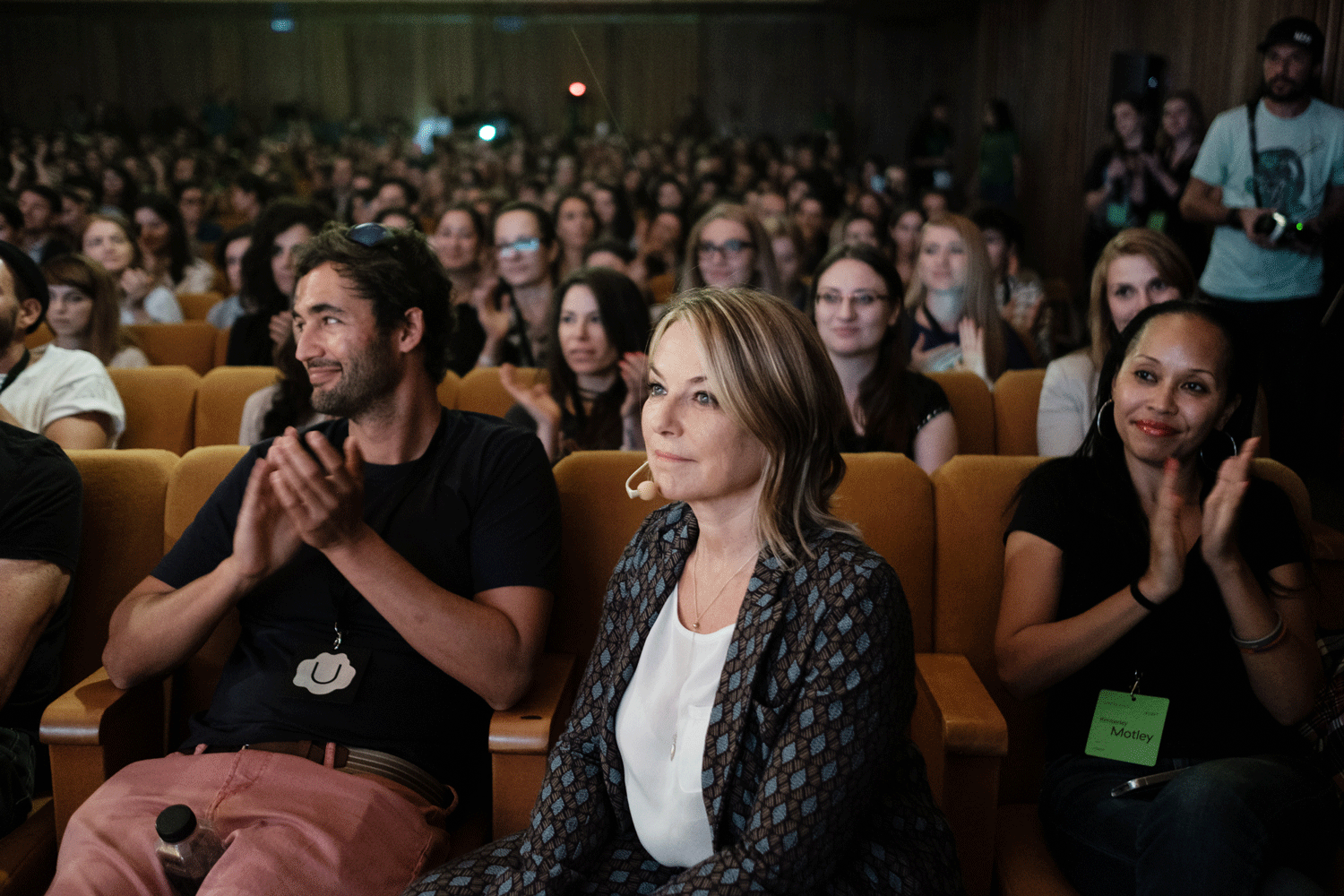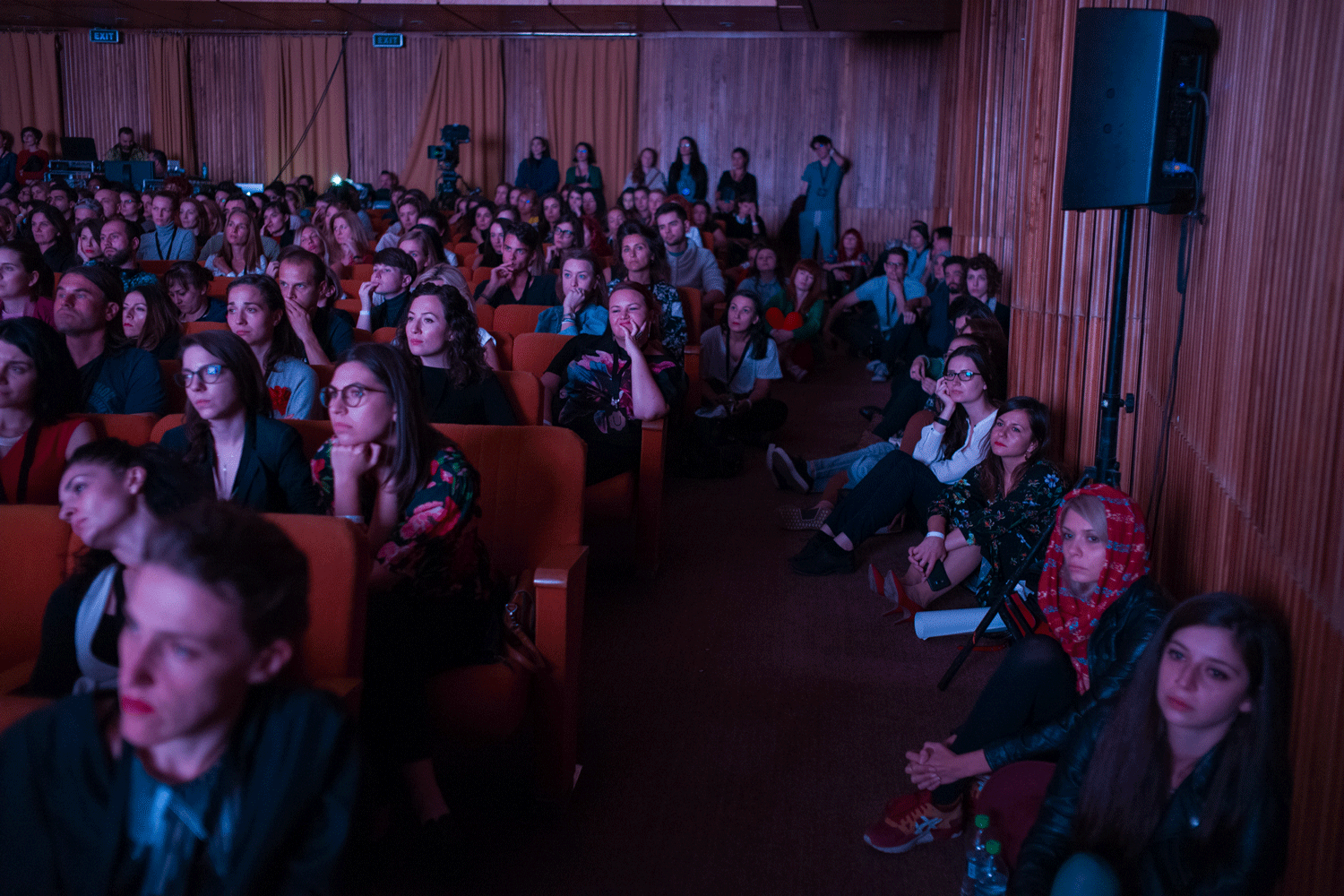
In a relationship, one person makes the other
A conversation with therapist Esther Perel about the modern couple, the polarizations within it, and a way out of them.
The quality of our relationships determines the quality of our lives, says Esther Perel, the world-renown therapist and author. The two books she wrote in the past dozen years, Mating in Captivity, and The State of Affairs arguably make her one of the most articulate modern voices on the subjects of relationships, sexuality, and love. (Both books are translated into Romanian).
She packs rooms large and small all over the world – from synagogues to TED halls – because, whether we can articulate it or not, relationships, especially couples, are of central importance to our modern lives. As Esther herself puts is “never before has the couple been such a central unit in our social organization. Never have we expected more from our intimate relationships, and never have we crumbled under the weight of so many expectations.”
The same happened on her return to Bucharest, where, in late September, hundreds of people flooded the Auditorium of the National Museum of Art to see her speak at Unfinished, a four-day festival that brought together important international artists, innovators, entrepreneurs from many disciplines. The room filled to capacity so much so that her talk couldn’t start until it was cleared of those left standing. These, along with a few hundred more, sat in a nearby auditorium, watching her speech live-streamed on monitors, and hanging on to her every word, as she explained the history of the couple, of marriage, and the pressure we put on our partners today to be everything: friend, confidante, support system, passionate lover, and someone that can help us transcend the mundane in life.
That’s a lot.
I was supposed to interview Esther after the talk, but she suggested we watch the other talks first (she especially wanted to hear the Chilean-born political artist Alfredo Jaar). By the end of the night she was hungry, tired, but generous, and offered to keep our plans, and meet over early morning coffee at her hotel. Our encounter was less structured than an interview, which is why I’ve condensed it, edited it for clarity, and asked Esther herself to review it.
Its lack of formal structure is also why we’re printing it in English. Questions and transitions are in italics; the rest is all Esther.

We started our discussion with her reading a very thoughtful email she had received the night before from a woman who was in the audience, and who explained some of the socio-economics of modern Romanian society, its recent past, and how these forces shaped the power dynamics, and interactions in couples here.
You were among the most repressed of the communist regimes. Ceaușescu had this fake semblance of openness, but inside he was more harsh and brutal than Poland, Czechoslovakia (at the time) or Hungary.
It seems to me that the social fabric in Romania got so torn, as everyone was spying on everyone. The closer the people were to each other, the more suspicious they would be. It ruptured the fabric of trust.
In the traditional model, in rural Romania, and elsewhere, for so long people lived by rules, duty and by obligation, and people had rather small expectations from their marriages. All the big decisions were made for them, they had only a narrow slice of freedom for small decisions in their lives. And women ate shit, basically. Not that the men had a fabulous life, but she didn’t stop. And she needed a man to have a life – family, economic support and social status, to be complete, but once she had the man, she was subservient to him. And she resented the fact that she was told that she needed him.
I don’t think it’s often mentioned why women here defer marriage. Career is a piece, but I also think that many women saw their mothers and grandmothers, and that is really not what they want.
And I don’t blame them.
Your description of how relationships evolve resonates. Going from the pragmatic marriage, to the „fulfill all my needs” partnerships of today. Why do you think it’s important for people to understand the history and trajectory of marriage?
First of all, I’m the type of person who, to make sense of the present, needs to know the history. We run the risk that a set of social expectations is seen as a norm, a given even, a universal, when in fact it is often way more relative, recent, and not at all so obvious or a given.
Also because I think we’re using the same words, and they mean things that are completely different. So, for example, one of the questions I asked in the first book, on the nature of desire in relationships, was this: when did desire become the central organizing principle of sexuality in long term relationships, and what did it mean for this generation of the 60s that had for the first time contraception in their hand, pre-marital sex as a norm, the permission to do what they want and no desire for it? Or at least not at home.
The logical thing was that they should be wanting it, right? And I wrote a book because I saw that there were a lot of sexless marriages.
But I can’t understand this without the historical context. Sexuality has always been the place where the most archaic, rooted, and traditional aspects of a culture or civilization are lodged and also the place in a society where the most radical progressive changes occur. Every society, every religion has practiced license and abstinence.
Same with infidelity: you can’t understand modern infidelity without understanding modern marriage. Why has infidelity suddenly become the first cause of divorce? Why is the new shame the shame of staying? Why do people cheat even in happy marriages? Why didn’t divorce render infidelity obsolete?
To me, our personal lives take place in a sociological context. Our narratives are moments in time that are borne out of the political, social, and economical forces that surround us.
We say things, and we need to be very clear what we mean by them. That’s why I take the relationship vocabulary and explain it. Here is what intimacy used to mean. Here is what sex used to mean. Here is what marriage used to mean. Here is what happiness used to mean. Here is what children used to mean.
Can you imagine the amount of changes that took place? And I know they took place here.

We also talked about the reactions to her talk, which Esther was interested in unpacking. The crowd was riveted, connected, and we discussed about why they were so into her work, about the disproportionate presence of women in the audience, and about what it means that a few men stood when she asked if any had ever felt less in the presence of another man.
I think that what they felt is that I’m giving words, I’m giving a framework to a social experience, and to an individual experience. I create a frame for people to understand the things they are grappling with. I think that’s part of why people react the way that they do.
How do you understand the fact about the man that stood? And that women clapped for the man that stood? And how did the man feel?
I work with almost 20 women. All of them talk about how completely emotionally cut off men are. And there’s this pressure of always having to deliver, always having to perform, to be strong, to be one of the boys.
So the men were surprised that they were being clapped?
Yeah, I think so.
And they were moved?
I think they were moved. My sense is that we also have this stereotype that women in Romania need a strong man. So, if you stand up in a crowd and reveal that you are vulnerable, or that sometimes you feel you are not enough, that’s a risk and if people clap for you, you go: Really? Is that a permission for me to sometimes fall down?
Yes. That means being strong.
And that is still mostly the exception.
What you need is public health campaigns on relationships. My goal with my podcast, Where should we Begin?, is for people to listen to these sessions, and hear things they have never heard in their life. Because we need men who don’t think “this is what being a real man is”. It needs a whole new generation raised differently. If you see someone hitting, you ask: Who did this to you? Who did you learn it from? And who did you watch do this and nobody stopped them? Those are the three questions.
And it’s going to take another generation.
At least. It’s not like we don’t have violence in the US. But I think what is changing more than anything is the generation of women. What is really changing is my generation of women vs. the young women. It’s the boomer woman vs. the millennial woman.
I took a lot of things as part of what it is. I also learned to say “leave me alone”. I have probably had a series of experiences of “uh, what was I thinking?”, but they were part of the maturation process. The “yuck factor”, I call it. But we kind of accepted it as part of emancipation.
And also, there was a way we learned to discriminate nuances. If the construction worker talks to me, but he says it in a nice way, I respond nicely. But if he does it in a way that makes me feel like dirt, then I know the nuance. My generation, we were very very good at knowing nuance.
You think we’re losing some of that?
Yes, when I talk with the younger women… It’s changing. Is it losing?
We are a group of seven families that are close, and we have brought up our kids together, and we are seven foreigners and seven Americans. Sometimes there are two to a couple, and we have 13 children among us, and the oldest is now 26, and we began before they were born. And we meet every year at Thanksgiving. And the kids are like cousins to each other.
And last year we had a conversation in the midst of #metoo. A couple of the older fathers, the men, were talking about how they couldn’t understand the environment. They were used that you could be on the subway, and you could compliment someone. And one of the young girls said: “When I go to work in the morning, I want to be left alone. I don’t want your compliment.”
So I can only make you a compliment when you want it? You have to signal permission? It was a generation divide. I was like: “Give me the compliment. I didn’t just get dressed up for nothing. But give it to me with taste.”
It’s also something I attribute more to America. I see more rigidity and a greater difficulty to manage ambiguity. When you challenge rigidity, it breaks. You need malleability in life. Something similar happens with the notions of egalitarianism, which are taken in a very linear, concrete fashion.
This thing that I said yesterday – I drew on my work in Poland or Mexico –, where the woman needs the man, that in order to have social respectability she needs to be with a man. But then when she is with a man, her life is not particularly pleasant. He has overt power to control her behaviour, she has covert power to trample his masculinity.
Because she needs him.
Because she needs him, and because she thinks he is useless. You feed his belly, you feed him sexually, just the minimum, and then “just shut up and get out of my way”. You manage men, you tolerate them. But it’s basically contempt. The first time I really learned this is when my mother’s group of friends suddenly lost their husbands in their 60s, which was young.
And I, being Misses Romantic, said to my mother: “Aren’t they lonely, aren’t they sad?”
And my mother said: “They’re free. They don’t have to wash their socks anymore.” And I was like: “Oh, my God, this is a completely different story.”
The women are strong. I grew up with this sentence. The women are strong, the men are weak. Women can tolerate things. Women can tolerate pain and suffering. And they need to help the men deal with that as well. And they have three kids, plus one.
Sentence after sentence. And that is power, too. So he sexualizes her. And she infantilizes him. That’s an exchange of power.
The modern couple or gender dynamics are, as Esther says, particular to place and time. But conversation and nuance are hard to find everywhere these days, which is why we closed by talking about listening as a potential solution.
The situation is not a universal. Societies have their particularities. Power goes from the top down, and can also rise from the bottom up. Currently, in the US, women are willing to talk about the power that a man has in objectifying them, but they are not engaging in the other part of that same conversation, that talks about how they can humiliate men.
When you do couples therapy, you deal with polarized systems all the time. That is what couples therapy often entails. There is no bigger polarization than in a couple. They invalidate each other completely. And you see the manipulations. And you see the lies people do to themselves. And you see the abdications. So you learn not to just see it in linear terms. You see loops. In a relationship, one person makes the other. If you want to change the other, change yourself.
I was tempted to do a workshop while in Bucharest. But I can do that next time. If it’s a group of 50 people you take half women-half men. If you have 1,000 people, you take 30 of each. You put the men and the women in a circle, facing each other. You make them talk to each other, and the others in the room listen. You don’t create a dialogue; you invite people into the soliloquy.
And I can throw a question: guys, what I would like is a conversation about what are the parts of your identity as a man/woman that you have chosen, and what are the parts of your identity as a man that have been given to you.
And then I let them talk: 30 minutes, 45 minutes, an hour. And then I facilitate it. I go, and I deepen, and I deepen. And then, after an hour, I say to the listeners around: What did you hear? Not “what did you think about what they said?”. What did you hear?
Recently I had someone who said: “Well, what I didn’t hear…”. So I said: You can do this, but here is what’s going to happen. They will shut down. They just told you so much, and the first thing you say is “here’s what was missing”?
So I establish that, and then people get the message. And I find that more interesting, no matter if the women or the men are the center.
You feel it’s more effective?
Well, you hear the guys listening to the women’s inability to understand that men sometimes have a hard time, too, and then they begin to answer. And their tendency is to begin to get angry at the women for not having a clue. And that’s when you say to the guy: “She doesn’t know, you need to reach her. What is it that you need to tell her that will broaden her spectrum?”
So you don’t do this and let it go. You orchestrate it very carefully.
There are many ways to do things, and nothing works all the time. But if I was going to do it today, I think what needs to happen is a conversation where a group of men talk together in the presence of women, and forget that the women are there. If you do it well you forget that you are listened to. You let go of the self-consciousness that comes with openness, but you feel listened to nevertheless as you reveal more of yourself. Being connected to yourself in the presence of others, that is a powerful healing experience. That’s the power.
You can buy Esther’s books in Romania through her local publisher, Curtea Veche. You can listen to her podcast of recorded sessions with real couples, here. Learn more about Unfinished, the festival Esther spoke at, here.
S-ar putea să-ți mai placă:
Editorial DoR #30: Alege‑ți ficțiunea
Un drum pe care n‑ai umblat e plin de potențiale pericole.
My Dearest Stranger
După câteva luni de corespondență virtuală, ne-am refugiat pentru trei zile la Paris. Când ne-am sărutat, aveam familiaritatea unui cuplu cu vechime.
Cum vede lumea fiica mea de 10 ani
Flari este fiica mea și s-a născut în 2009. Toamna asta a împlinit 10 ani, la fel ca DoR, așa că am întrebat-o cum vede lumea și cum se vede pe sine. Tot în DoR, acum cinci ani, am scris ce am învățat de la ea. Iată ambele texte, în oglindă.


